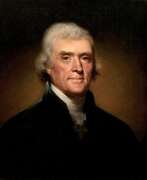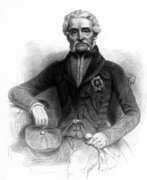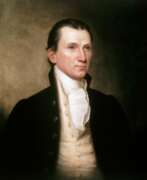British Empire 19th century


Thomas Jefferson was an American politician and statesman, the third President of the United States (March 4, 1801 - March 4, 1809).
Jefferson was the son of a planter and received a law degree. In 1774, he wrote A Summary of the Rights of British America, which attracted public attention, and he soon gained a reputation as one of the first advocates of American independence from the authority of the British Parliament. In the spring of 1775, the Virginia legislature appointed him a delegate to the Second Conference of the Continental Congress. A year later he was appointed to a committee of five, which also included Adams and Benjamin Franklin, to draft a formal statement of reasons to justify a break with Great Britain. Jefferson thus became one of the authors of the Declaration of Independence. Jefferson succeeded Benjamin Franklin as minister to France in 1785, was secretary of state (1790-1793) under Washington, and vice president (1797-1801) under John Adams.
A Democratic-Republican, Jefferson, who believed that the national government should play a limited role in the lives of citizens, was elected president in 1800. One of the most significant accomplishments of Jefferson's first administration was the purchase of the Louisiana Territory from France for $15 million dollars in 1803 (from the Gulf of Mexico to present-day Canada), effectively doubling the size of the United States. During his second term, Jefferson was focused on trying to keep America out of the Napoleonic Wars in Europe. After his second term as president, he was succeeded by James Madison in 1808.
Upon leaving office, Jefferson retired to his plantation in Virginia, pursued his favorite pastimes, and helped found the University of Virginia. In addition to politics, he is known as a writer, farmer, horticulturist, inventor, book collector, art historian, architect, and scientist. He died at the age of 83 on July 4, 1826, the 50th anniversary of the Declaration of Independence.


Harry George Wakelyn Smith was a British military officer, colonial governor and high commissioner in South Africa.
Smith began his career in the army as an ensign in 1805, serving in South America (1807), then in Spain. During the War of 1812 in America, Smith Sir Harry Smith was with the British forces that captured and burned Washington, D.C.. He was also a brigade major at the Battle of Waterloo in 1815. Smith later commanded a division in the Kafir War (1834-36), during which he made the famous 1,130 km journey from Cape Town to Grahamstown.
From 1835 he was governor of the newly annexed frontier territory named Queen Adelaide prov. Smith was then transferred to India as deputy adjutant general and distinguished himself in the Sikh Wars, especially at the Battle of Aliwala in 1846. Returning to South Africa as governor of the Cape Colony (1847-52), he continued his policy of expansion and waged war on the Boers. In March 1852 he was recalled to Britain, where he held various military posts for the rest of his life. Harry Smith wrote an autobiography which was first published in 1901.



